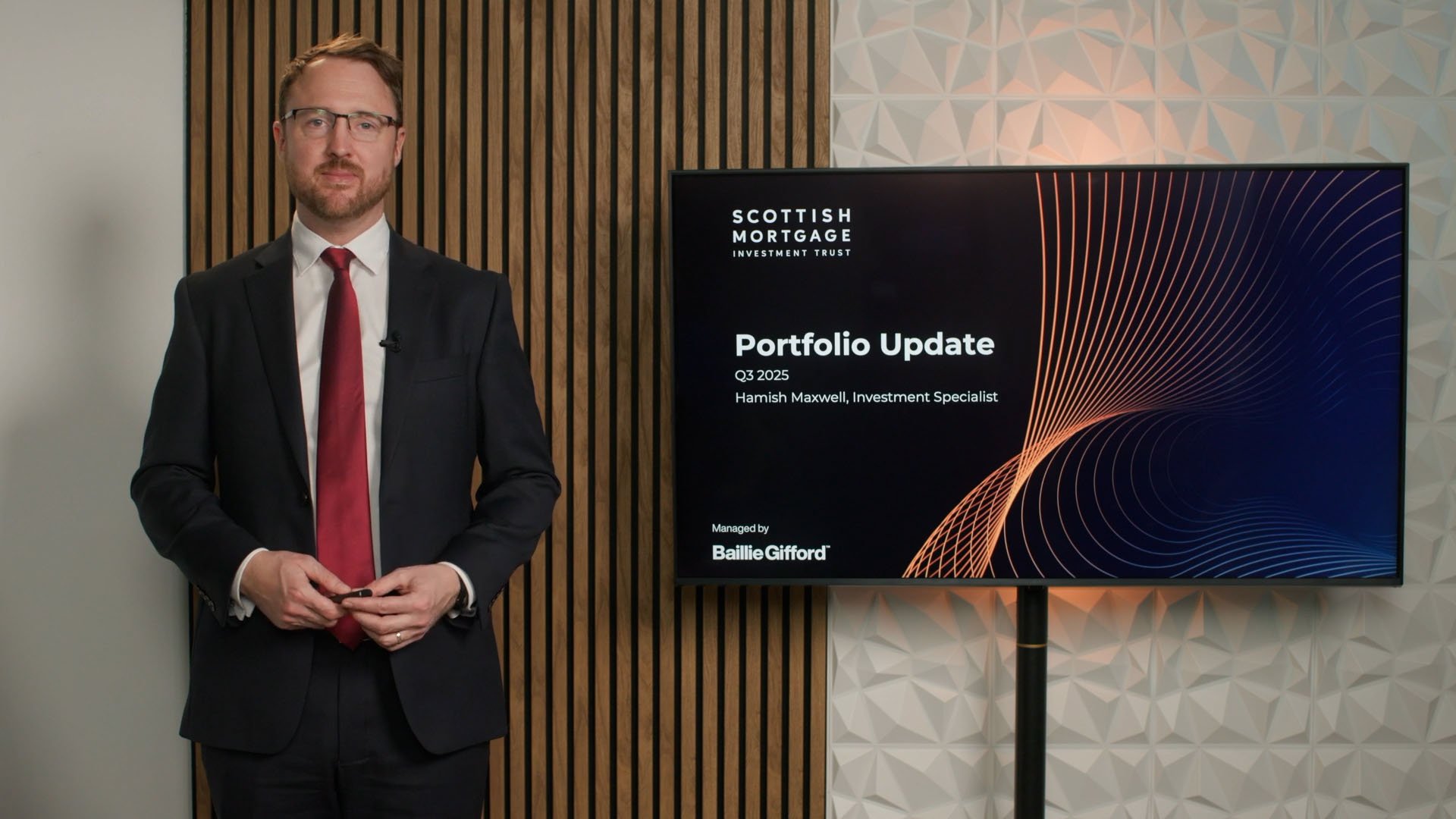Trip Notes: Seoul and Mumbai
Lawrence Burns – Deputy Manager, Scottish Mortgage Investment Trust
- Asia’s growing population and rising wealth work in favour of its exceptional companies
- South Korea-based Coupang is the country’s largest online retailer, selling fresh groceries among other products
- India’s expanding middle class and its demand for mortgages and other financial services should drive HDFC Bank’s long-term growth

Please remember that the value of an investment can fall and you may not get back the amount invested.
As a first-timer in Seoul, I was struck by how the giant metropolis felt at once huge and compressed. About 26 million people live in and around South Korea’s capital, over half the country’s population. And the city itself is home to nearly twice as many residents per square foot as New York, making it one of the most concentrated on the planet.
My hotel was close to the Lotte World Tower, a slender 123-storey cone climbing over half a kilometre high. Through enormous windows at the top, I took in the urban sprawl radiating from both banks of the Han River. To the north, countless tower blocks stretched towards Mount Bukhan’s granite peak. A little over 20 miles beyond lay North Korea.
Seoul’s human density is a boon to Scottish Mortgage portfolio company Coupang. The nation’s leading ecommerce firm has said 70 per cent of South Koreans live within 10 minutes of one of its warehouses. That has enabled its Rocket Delivery service, which out-Amazons its US counterpart by guaranteeing delivery of items ordered before midnight by seven the next morning.
This is also one of the few places in the world where the economics of selling fresh groceries online are compelling. It helps that Coupang’s deliveries are so fast that its transit vehicles don’t need cold-chain storage. It also matters that retail space in Korea is so expensive and thus sparse that brick-and-mortar stores offer a limited and costly choice of goods.
I was told the cheapest place to buy milk in Korea is on Coupang. It is therefore remarkable, but perhaps not entirely surprising, that Coupang claims to have the biggest fresh grocery business in Korea out of both online and offline competitors.
Coupang’s progress
We first got to know Coupang before the company listed its shares in early 2021. We admired its ambitious management team and formidable logistics advantage. However, we struggled to see a reasonable pathway to the firm being worth a large multiple of its value at that point, and so we passed.
The shares subsequently fell about 70 per cent, but the operational progress has been impressive, with revenues consistently growing above 20 per cent annually and the company going from heavily loss-making to generating well over $1bn in free cash flow a year (ie the amount left over after running costs and spending on equipment, technology and other assets). We used this sell-off as an opportunity to take a holding last year.
I visited Coupang’s HQ just after the Lunar New Year, the local equivalent of dropping by shortly after Christmas. Founder-leader Bom Kim had recently come to see us in Edinburgh, so I took the chance to get better acquainted with chief financial officer Gaurav Anand, an online retail veteran with experience in the US and India. He proved just as evangelical as Bom about Coupang’s mission to offer the best selection, prices and convenience.

We discussed the advantages of fresh groceries and the company’s expansion into Taiwan, where it has just opened a second logistics centre and plans a third. It’s challenging the island’s leading player, Shopee, owned by another Scottish Mortgage holding, Singapore-based SEA.
We believe each business has different strengths. Coupang is stronger in standardised products with fast delivery. Shopee excels at selection, discovery and providing shopping almost as a form of entertainment. What we have learned over the years is that there is no single model to address all ecommerce needs. The access we have to both management teams helps guide us and test our hypothesis.
Farfetch takeover
Anand also updated me on Coupang’s takeover of upmarket fashion and beauty marketplace Farfetch. South Koreans are the world’s biggest spenders on luxury, purchasing $325 worth of high-end handbags, clothes, watches and other items per capita in 2022, according to one study.
This is a sector where access to supply trumps price because the companies involved can be picky, preferring to forgo a sale rather than be associated with a vendor that might debase their brands.
Coupang now has a chance to leverage Farfetch’s brand positioning and combine it with its own efficient logistics network. But might the acquisition distract management?
We have expressed concerns. The firm is already busy with plenty of new business initiatives, including Coupang Eats meal deliveries, Coupang Pay money transfers and Coupang Play video streaming. However, Anand and others have assured us that a separate team is running Farfetch, and it isn’t taking up huge amounts of Bom’s or other senior executives’ time.
Among other companies I visited was Lotte, one of the country’s mightiest chaebols, or conglomerates. It has partnered with our British holding Ocado to build six automated warehouses in South Korea.
The buildings will debut a vertical design, with multiple layers of robots whizzing about grids, grabbing goods-filled storage bins to fulfil customer orders. The innovation is a necessity given that industrial space is at such a premium.
Beyond China
This trip was partly spurred by the Trust’s evolving position on China.
Over the past year, we have raised the bar on what Scottish Mortgage requires of Chinese companies, given the possibility of further regulatory intervention from the Chinese government and geopolitical tensions threatening further trade restrictions from the US and others.
We’ll still take risks, but only where we see the possibility of truly substantial upside. So, for example, we remain invested in PDD Holdings, owner of the online marketplace Temu.
We also continue to own local services company Meituan. However, we have sold out of Alibaba and Tencent.
In reducing our exposure to China, we don’t want to get too skewed towards developed markets. Rising incomes and population growth favour large parts of Asia, so we are spending more time in the region seeking out companies capable of creating exceptional value. And that’s why I headed to Mumbai for the second leg of this trip.
Improving India
Whereas South Korea had seemed orderly, India offered a more hectic experience. My Uber nearly crashed at least three times on the drive from the airport, with everyone following their own rules on the road. This environment would probably be the greatest test on Earth for Tesla’s full self-driving software!

This was my third visit to India’s commercial hub. Improvements since my first, a decade earlier, were obvious. An eight-lane coastal motorway and a 22km-long sea bridge are two striking examples of layered-on mega-infrastructure. Massive new shopping malls are packed with international stores, and you can also see organised, branded retail becoming more common elsewhere. Meanwhile, many of the cramped four-storey chawl tenement blocks that provided industrial workers with low-cost housing have been replaced by gleaming 40-storey skyscrapers.
Banking merger
I was keen to catch up with our sole Indian holding, HDFC Bank. It’s the result of a merger between the firm’s mortgage business and its banking subsidiary last year in a deal that created the world’s fourth-largest lender in valuation terms.
Scottish Mortgage first invested in the home-loan parent in 2004, and a large part of the attraction was its exceptional management culture. Several executives from the banking side are now in leading roles, so this was a chance for me to meet them and check if our investment case had changed.
You can’t answer that question from a single meeting, but you can get a feel. Mine was that there are reasons to stay invested and continue to monitor the situation.
As more Indians open bank accounts, borrow and raise finance, HDFC has a multi-decade opportunity to extract a kind of royalty from the growth of India’s urban middle class. Moreover, becoming a single entity should lead to more cross-selling of products and data sharing to improve them.
Simultaneously, HDFC’s Commercial and Rural Banking division is opening branches outside the big cities, where GDP is growing even faster and the bulk of the population still lives. For many farming communities, this is the first time they have had access to credit from a trusted brand rather than loan sharks charging predatory rates.
WhatsApp’s appeal
By chance, Meta’s local chief scheduled an event during my visit, which I attended. My colleague Tom Slater writes about why we recently reinvested in the firm elsewhere in Trust. But I’ll just note that India is among Meta’s largest global user bases.
More than half a billion people in India use its WhatsApp chat app and 60 per cent of them message and interact with a business at least once a week using the app. The usage of these apps appears even deeper and broader in India than it does in the west. Meta views India as a testbed for innovation.
I also met several promising local companies specialising in tourism, financial services, logistics and private healthcare.
India’s market has tended to go through cycles of enthusiasm. At the time of writing, euphoria rules. So while many of these businesses have strong prospects, their current valuations make them less attractive than other options.
The point of these investment trips, though, is to build knowledge and networks to lay the long-term foundations for future investments. I’d be surprised if India, and Asia more broadly, do not grow as a proportion of the Trust over the next few decades. Having a global canvas matters when searching for outliers.
Annual past performance to 30 June each year (net%)
| 2020 | 2021 | 2022 | 2023 | 2024 | |
| Scottish Mortgage Investment Trust | 55.4 | 62.8 | -46.1 | -6.3 | 33.4 |
Source: Morningstar, share price, total return, sterling.
Past performance is not a guide to future returns.
Investments with exposure to overseas securities can be affected by changing stock market conditions and currency exchange rates. The Trust invests in emerging markets, which includes China, where difficulties with market volatility, political and economic instability including the risk of market shutdown, trading, liquidity, settlement, corporate governance, regulation, legislation and taxation could arise, resulting in a negative impact on the value of your investment.
About the author - Lawrence Burns
Deputy Manager, Scottish Mortgage Investment Trust
Lawrence is deputy manager of Scottish Mortgage Investment Trust. He joined Baillie Gifford in 2009, and his investment focus is on transformative growth companies.
Regulatory Information
This content was produced and approved at the time stated and may not have been updated subsequently. It represents views held at the time of production and may not reflect current thinking. Read our Legal and regulatory information for further details.
A Key Information Document is available by visiting our Documents page. Any images used in this content are for illustrative purposes only.
This content does not constitute, and is not subject to the protections afforded to, independent research. Baillie Gifford and its staff may have dealt in the investments concerned. The views expressed are not statements of fact and should not be considered as advice or a recommendation to buy, sell or hold a particular investment.
Baillie Gifford & Co and Baillie Gifford & Co Limited are authorised and regulated by the Financial Conduct Authority (FCA). The investment trusts managed by Baillie Gifford & Co Limited are listed on the London Stock Exchange and are not authorised or regulated by the FCA.
Baillie Gifford Asia (Hong Kong) Limited 柏基亞洲(香港)有限公司 (BGA) holds a Type 1 licence from the Securities and Futures Commission of Hong Kong to market and distribute Baillie Gifford’s range of collective investment schemes and closed-ended funds such as investment trusts to professional investors in Hong Kong.
Baillie Gifford Asia (Singapore) Private Limited (BGAS) is regulated by the Monetary Authority of Singapore as a holder of a capital markets services licence to conduct fund management activities for institutional investors and accredited investors in Singapore. BGA and BGAS are wholly owned subsidiaries of Baillie Gifford Overseas Limited, which is wholly owned by Baillie Gifford & Co.
Europe
Scottish Mortgage Investment Trust PLC (the “Company”) is an alternative investment fund for the purpose of Directive 2011/61/EU (the “AIFM Directive”). Baillie Gifford & Co Limited is the alternative investment fund manager (“AIFM”) of the Company and has been authorised for marketing to Professional Investors in this jurisdiction.
This content is made available by Baillie Gifford Investment Management (Europe) Limited (“BGE”), which has been engaged by the AIFM to carry out promotional activities relating to the Company. BGE is authorised by the Central Bank of Ireland as an AIFM under the AIFM Regulations and as a UCITS management company under the UCITS Regulation. BGE also has regulatory permissions to perform promotional, advisory and Individual Portfolio Management activities. BGE has passported its authorisations under the mechanisms set out in the AIFM Directive.
Belgium
The Company has not been and will not be registered with the Belgian Financial Services and Markets Authority (Autoriteit voor Financiële Diensten en Markten / Autorité des services et marchés financiers) (the FSMA) as a public foreign alternative collective investment scheme under Article 259 of the Belgian Law of 19 April 2014 on alternative collective investment institutions and their managers (the Law of 19 April 2014). The shares in the Company will be marketed in Belgium to professional investors within the meaning the Law of 19 April 2014 only. Any offering material relating to the offering has not been, and will not be, approved by the FSMA pursuant to the Belgian laws and regulations applicable to the public offering of securities. Accordingly, this offering as well as any documents and materials relating to the offering may not be advertised, offered or distributed in any other way, directly or indirectly, to any other person located and/or resident in Belgium other than to professional investors within the meaning the Law of 19 April 2014 and in circumstances which do not constitute an offer to the public pursuant to the Law of 19 April 2014. The shares offered by the Company shall not, whether directly or indirectly, be marketed, offered, sold, transferred or delivered in Belgium to any individual or legal entity other than to professional investors within the meaning the Law of 19 April 2014 or than to investors having a minimum investment of at least EUR 250,000 per investor.
Germany
The Trust has not offered or placed and will not offer or place or sell, directly or indirectly, units/shares to retail investors or semi-professional investors in Germany, i.e. investors which do not qualify as professional investors as defined in sec. 1 (19) no. 32 German Investment Code (Kapitalanlagegesetzbuch – KAGB) and has not distributed and will not distribute or cause to be distributed to such retail or semi-professional investor in Germany, this document or any other offering material relating to the units/shares of the Trust and that such offers, placements, sales and distributions have been and will be made in Germany only to professional investors within the meaning of sec. 1 (19) no. 32 German Investment Code (Kapitalanlagegesetzbuch – KAGB).
Luxembourg
Units/shares/interests of the Trust may only be offered or sold in the Grand Duchy of Luxembourg (Luxembourg) to professional investors within the meaning of Luxembourg act by the act of 12 July 2013 on alternative investment fund managers (the AIFM Act). This document does not constitute an offer, an invitation or a solicitation for any investment or subscription for the units/shares/interests of the Trust by retail investors in Luxembourg. Any person who is in possession of this document is hereby notified that no action has or will be taken that would allow a direct or indirect offering or placement of the units/shares/interests of the Trust to retail investors in Luxembourg.
Switzerland
The Trust has not been approved by the Swiss Financial Market Supervisory Authority (“FINMA”) for offering to non-qualified investors pursuant to Art. 120 para. 1 of the Swiss Federal Act on Collective Investment Schemes of 23 June 2006, as amended (“CISA”). Accordingly, the interests in the Trust may only be offered or advertised, and this document may only be made available, in Switzerland to qualified investors within the meaning of CISA. Investors in the Trust do not benefit from the specific investor protection provided by CISA and the supervision by the FINMA in connection with the approval for offering.
Singapore
This content has not been registered as a prospectus with the Monetary Authority of Singapore. Accordingly, this content and any other content or material in connection with the offer or sale, or invitation for subscription or purchase, of the Trust may not be circulated or distributed, nor may be offered or sold, or be made the subject of an invitation for subscription or purchase, whether directly or indirectly, to persons in Singapore other than (i) to an institutional investor (as defined in Section 4A of the Securities and Futures Act 2001, as modified or amended from time to time (SFA)) pursuant to Section 274 of the SFA, (ii) to a relevant person (as defined in Section 275(2) of the SFA) pursuant to Section 275(1), or any person pursuant to Section 275(1A), and in accordance with the conditions specified in Section 275 of the SFA, or (iii) otherwise pursuant to, and in accordance with the conditions of, any other applicable provision of the SFA.
Where the Trust is subscribed or purchased under Section 275 by a relevant person which is:
(a) a corporation (which is not an accredited investor (as defined in Section 4A of the SFA)) the sole business of which is to hold investments and the entire share capital of which is owned by one or more individuals, each of whom is an accredited investor; or
(b) a trust (where the trustee is not an accredited investor) whose sole purpose is to hold investments and each beneficiary of the trust is an individual who is an accredited investor, securities or securities-based derivatives contracts (each term as defined in Section 2(1) of the SFA) of that corporation or the beneficiaries’ rights and interest (howsoever described) in that trust shall not be transferred within six months after that corporation or that trust has acquired the securities pursuant to an offer made under Section 275 except:
(1) to an institutional investor or to a relevant person or to any person arising from an offer referred to in Section 275(1A) or Section 276(4)(c)(ii) of the SFA,
(2) where no consideration is or will be given for the transfer;
(3) where the transfer is by operation of law; or
(4) pursuant to Section 276(7) of the SFA or Regulation 37A of the Securities and Futures (Offers of Investments) (Securities and Securities-based Derivatives Contracts) Regulations 2018.





